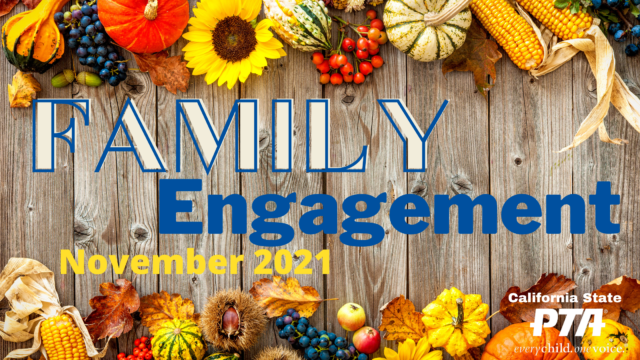Byline: Heather Ippolito, California State PTA Vice President for Family Engagement
At schools all over the country, educators and community members are working to build stronger connections between families and schools. We already shared some takeaways from the keynote speakers at the Family Engagement Summit. Here are some ideas and best practices to share with other PTA leaders and school and district administrators.
Moving from Involvement to Engagement
The Virginia Beach Schools Office of Family Engagement spoke about moving from involvement to engagement. Involvement is doing things to reach families (calls, emails, telling parents what to do) while engagement is doing things with families (partnering, including families in decision-making and treating them as partners).
Virginia Beach has a districtwide Family Empowerment Group that serves as a safe space for families to share things that are happening in the district, and to work together to advocate for change. Local PTAs might consider advocating for this in your schools — a place to begin two-way communication and work together to solve key issues facing our families.
Getting Advice from the Experts
A digital citizenship webinar hosted by CommonSense shared tools to help schools engage families in the digital citizenship conversation. Steps include planning, implementing, and evaluating the program. Their website is full of resources, all by grade level, that could be helpful to include in a STEAM event or in a PTA newsletter. (For more about these resources see the recent blog on our website.)
The National Parent Leadership Institute has been working with the Merced School District and a non-profit called Valley Onward for several years. The inspiring thing about this partnership is that the entire community is working together to support families. The schools and the extended community all know what an asset they are to our families and have rallied around them — this could be replicated in your area using our School Smarts program.
Thinking Out of the Box
Lisa Elliott, Superintendent of the Greenfield School District in Wisconsin shared best practices for engaging families — including some out-of-the-box things. Greenfield has a district team of Family Engagement Champions that set yearly goals for family engagement. The team is made up of parents, teachers, and administrators who keep the family engagement agenda moving forward.
They begin engaging their school district families at birth — mailing a bib, book, and information on early learning to the home of every child born into their district boundaries. The district also has playgroups for children aged 0-3 called Play to Learn. They meet at the library, district office, and at school sites to help families build connections with the schools and community. Finally, they have a senior tax credit program. Seniors on social security can get up to a $500 tax credit by working in the schools as volunteers. They earn $6.50 per hour when they work and the program is paid for by the district. They match the seniors up with their talents — library helpers, classroom volunteers, yard duties, etc. They have said that for the financial investment they make (last year it was around $14,000) they have seen incalculable gains (especially when they need community support for educational issues).
Listening to Parent Voices
Ari Gerzon-Kessler from Colorado spoke about recognizing the disconnect regarding family engagement. While planning a family night, he realized he didn’t have families in the room. To correct this lack of engagement the district formed groups of parents, students, educators, and administrators at each school. Families and Educators Together (FET). The group meetings consist of 90-minutes of listening to parent voices — administrators were tasked with investigating issues that come up during the listening sessions and then problem-solving with the team. They have found these groups to be very impactful (especially for administrators who listen to solutions from educational partners, like the students and parents).
Focusing on a Key Subject – Math
Building a family math learning community including parents, district leaders, and non-profit groups is a project in a Massachusetts community. They shared that early math skills are a predictor of graduation and that parent attitudes toward math matter for student success. They began having playgroups at churches, libraries, laundromats, and other places in the community to help educate families by sharing easy things they can do to increase math skills and vocabulary at home. Their website is full of math games, videos and resources for families to encourage early math literacy.
Learning from Each Other
The programs and practices presented above are things that PTA Leaders can learn from. These are examples of why family engagement is essential to the success of our schools and hopefully they provide practical ideas for your communities.
Please share your family engagement ideas with us using this simple form.
